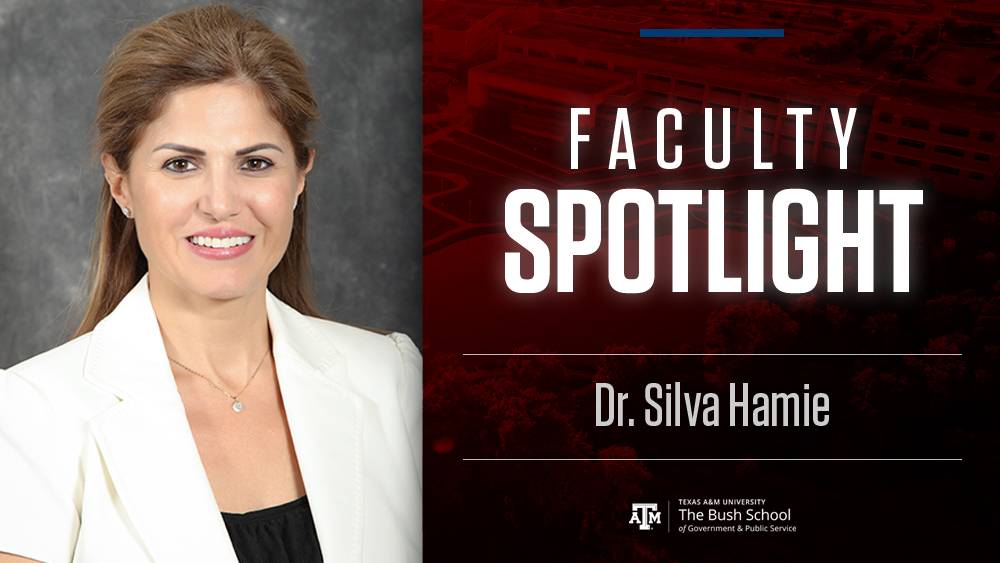
Dr. Silva Hamie, a Bush School lecturer since 2014, teaches courses in post-conflict recovery and development, the role of international organizations in peace and conflict, and qualitative research methods. This semester, she is teaching a class on clientelism, which looks at corruption in the developing world, and is also leading a capstone project for second-year students.
Born in Lebanon, Hamie earned her BA in political science at Beirut University College and her MA in international relations at the Lebanese University in Beirut. After completing these degrees, she moved to England, where she earn her PhD in politics from the University of York.
While completing her coursework there, Hamie also taught at the University of York, including courses on the causes of armed conflict. She says her teaching style developed and evolved while she was teaching and completing her PhD. Today, Hamie says she encourages her students to truly engage with the material and plans activities that foster this hands-on learning experience.
Post-graduate school work also influenced her future research and teaching. After earning her doctorate, Hamie worked for Oxfam GB, first monitoring, analyzing, and reporting on humanitarian developments in heavily targeted areas during and after the war in Lebanon. She later built a network with local and international NGOs, local governmental agencies, journalists, researchers, UN agencies, ministries, and politicians and integrated a “preparedness plan,” taking into account the updated political situation in Lebanon.
Hamie recognizes that days in graduate school are long and often difficult and that keeping students focused can be a challenge. “When you have a three-hour class, I know students will get sleepy and they’ll be tired—especially if it’s on a Friday afternoon,” she said. To combat this, Hamie likes to choose a fun but relevant question for her students to explore. For example, one of her classes was discussing disaster relief, so she told her class: “Imagine a conflict is happening, and the bombing or hurricane has reached your town; you have five minutes to decide what to take with you while you’re evacuating.”
While some students seemed to think they were going camping, the point of the exercise was to demonstrate the speed at which evacuation decisions must be made. Not only did the exercise serve as a conversation starter, it kept students engaged in the class, which is what Hamie aims to do in all her classes.
“My teaching style is engaging,” she said. “It’s not just lecturing; you don’t just come, take notes, and go home. I like the students to feel like they own the class.”
One way she allows students to feel they have a stake in the class is by having each student lead the discussion over the course of the semester. Hamie also incorporates a brief simulation into each class that gives students the opportunity to work in groups, strengthening team building skills throughout the semester.
Hamie is known for taking her classes on trips where they are able to learn in a hands-on environment. Last year, she took her post-conflict recovery and development class to Jacksonville, Florida, to evaluate the recovery of Hurricane Matthew that swept through the city in 2016. She would like to expand this hands-on, involved learning experience by leading a study abroad trip in the future, which will give students the opportunity to study two things at once. Not only will they learn about a case study or a particular issue, they also will gain an understanding of the context of the issue as it pertains to the specific country.
She currently is leading a capstone project that is examining UNICEF’s education program for Syrian refugee children in Lebanon, which is part of a larger research project analyzing the host community’s response to refugee influxes. Hamie is also working on a research project with her colleague at the Bush School, Dr. Mu, examining why refugees choose the location to which they flee.
Hamie has always been interested in issues in the Middle East and North Africa (MENA), and her research largely reflects this. Previously, she has published papers on talent development in the region and a piece on the workplace culture and human resources.
